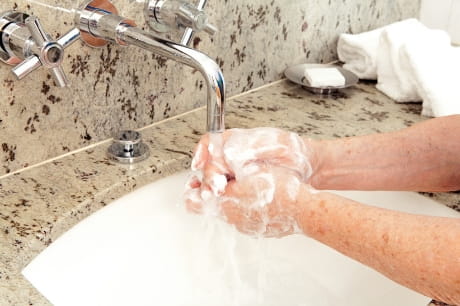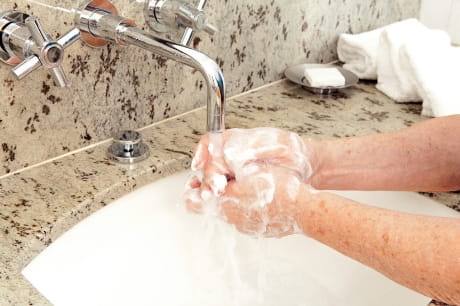Stay healthy by washing your hands
No matter the time of year, it's always important to remember to properly wash our hands. Doing our part with proper hygiene can help to slow and even stop the spread of diseases.
“Kids aren’t the only ones absentmindedly putting their hands into their mouth, and washing your hands for just 20 seconds can stop viruses like the cold or flu,” says Dr. Christian Shuman, a family doctor at Geisinger Pottsville. “It’s is an easy way to protect ourselves from many common illnesses, while also slowing the spread to others.”
Not only are we protecting ourselves when we wash our hands, but we're protecting everyone around us who we come into contact with.
How to wash your hands
Proper handwashing is defined as a vigorous 20-second scrub with soap and warm water that extends beyond the hands to the wrists, between the fingers and under the fingernails.
The Centers for Disease Control and Prevention (CDC) also recommends that you avoid touching the faucet or bathroom door with newly cleaned hands and instead use a paper towel.

“Germs are more resilient than we think,” says Dr. Shuman. “A short rinse or scrub without soap may leave some illness-causing germs behind.” Plus, our hands act as carriers for the germs, transporting them between surfaces.
Why is it important to wash your hands?
Those resilient germs that will survive a brief wash can also survive a light cleaning. Public spaces like trains, subways, buses, hotel lobbies and taxi cabs are a major source of germs, as well as our own kitchens and bathrooms. This is why it’s important to clean with a disinfectant, too.
Without regular hand washing, germs can get into your body while you're eating or drinking. We often touch our face, eyes, nose and mouth without even thinking about it during the day. This contact releases the germs into our body, challenging the immune system.
“Nail biting is a common problem for many adults, and that act gives germs a bridge from your hands to your mouth,” says Dr. Shuman. “While breaking this habit can take time, keeping your hands clean is a good first step.”
And remember to always cover your mouth and nose with a tissue or the inside of your elbow when you sneeze or cough. Germs can become airborne thanks to an uncovered cough or sneeze, leaving them on surfaces, clothing or causing us to breathe them in.
Stop the spread of germs
Common colds are the most common cause of sick days in both adults and children. Most people get colds in the winter and spring, but they can come year-round and are marked by seven to 10 days of sore throat, coughing, sneezing, headaches and body aches. However, they can be prevented with a few more seconds at the bathroom sink.
“Research suggests that as many as 45 percent of colds can be prevented with regular hand washing,” says Dr. Shuman.
Stomach bugs, most commonly caused by the Norovirus germ, are marked by the sudden onset of symptoms like vomiting and diarrhea. The bug is most commonly caused by cross-contamination from food and cooking surfaces.
“In addition to washing hands, properly washing food and kitchen surfaces will help prevent stomach bugs,” says Dr. Shuman.
In all, if you aren’t near a sink, hand sanitizer is an acceptable option for fighting germs on your hands, but make sure the formula is over 60 percent alcohol.
The flu and respiratory viruses, which are sometimes mistaken for the common cold, share symptoms like coughing, runny nose and body aches. However, the flu comes on much faster than a cold, lasts longer and can sometimes come with serious complications.
If you have symptoms of a cold or flu, the best thing to do is:
- Stay home
- Rest
- Drink plenty of fluids
- Keep an eye on your symptoms and call your doctor if they worsen
If you encounter someone with these symptoms, avoid contact and keep your distance. Certain viruses with these same symptoms can cause more serious respiratory viruses, including a new strain of coronavirus called COVID-19 which can lead to pneumonia and breathing issues.
Symptoms of a COVID-19 infection can resemble that of a cold or flu and typically include a fever, shortness of breath and cough. While most people with COVID-19 will have minimal symptoms and fully recover, those with certain underlying health conditions and who are over age 60 have a higher risk for developing the infection and related complications.
Simply washing your hands regularly and for at least 20 seconds can help cut back on the spread of these viruses, and protect yourself and others.
Next steps:
Make an appointment with Christopher Shuman, MD
4 tips for flu season etiquette

Telemedicine video visits
See your doctor from the comfort of home — from routine care to specialty care
Get virtual care nowCOVID-19 updates: Visit Geisinger's Coronavirus Resource Center for the latest information and helpful resources.



